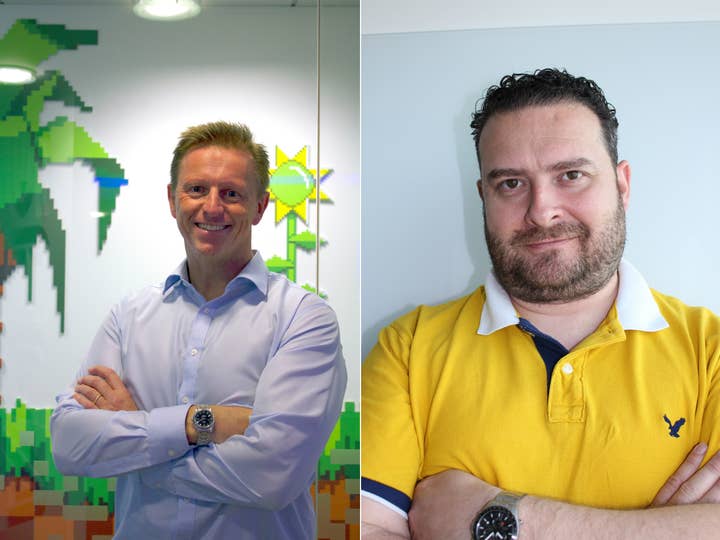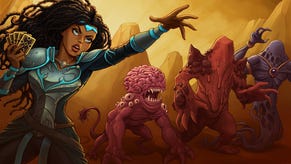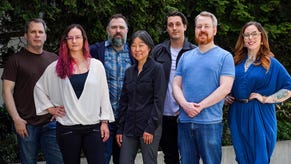Why Sega is obsessed with Humble Bundle
The Sonic maker has raised over $2m via the charity retailer
Sega was being uncharacteristically shy when we visited the firm's London HQ.
The publisher wanted to tell us about its work with Humble Bundle. The aim was so we could write an article (this one) about the success it has had, share its experience and hopefully encourage other companies to do more.
But Sega has spent the best part of a decade doing work with charities and trying not to be boastful about it. It has generated thousands of dollars from in-game items, it has worked with the Willow Foundation to included a seriously ill fan in Total War, it has run numerous charity events, and some of its staff are even ambassadors and trustees of various initiatives. What's more, it has done ten Humble Bundles (more than any other company) and raised over $2m for various charities from that store alone.
"Charities are the ones that do all the good work," says John Clark, SVP of commercial publishing at Sega. "It is Humble that enables us to support the charities and all we have to do is give a bit of time. So we never really wanted to shout about this, even internally."
Sega is most eager to talk about Humble because it's this initiative that has enabled it to do so much more than previously, and hopes other companies will follow suit.
"In the past we were creating in-game items that might raise £10,000 or so," says James Schall, digital distribution director at the company. "Now £10,000 is an amazing sum of money, but if you look at the amount we're generating from Humble, you can easily see where the focus needs to be."

What's significant about Humble is that it's not entirely a charitable initiative. Publishers are not giving these games away for free. Humble takes a slice of the revenue, as does Sega, with the rest (the $2m-plus) going to the charities.
"It is really transparent," Clark says. "Anybody who is buying a game via Humble Bundle knows that we're getting money. That actually has a positive influence, because it means we can really support them and our team isn't taking time out for a 100% charitable initiative using our content. We think very carefully about what games go into the bundle, because we want people to increase the value of their donations. We want to make them feel like they're getting incredible content for their money.
"We can continue to support Humble because there is also a contribution to Sega. It has moved charity into the realms of us being able to have business meetings around it"
John Clark, Sega
"We have ten bundles, and we will do an eleventh, and a twelfth. We can do this because Humble exists. They do take a fee and they're very transparent about that, and we can continue to support them because there is also a contribution to Sega. It has moved charity into the realms of us being able to have business meetings around it. And that enables us to drive more."
There are other commercial benefits for the publisher, too. Sega says that many of people who buy its bundles are entirely new customers. This means it is widening the fanbase for some of its IP, who then go on to buy the DLC and future titles, too.
"When we sell a Total War title through Humble, we tend to find we're getting a new customer," Clark explains. "And then we can sell them DLC or whatever. "
Schall adds: "Consumers are discovering products they may not normally have bought because of Humble. In this age of Steam being a huge driver for everybody's revenues, and with discoverability being such a difficult thing on Steam, this allows you to reach more people in such a positive way."
The commercial benefits are certainly there, but Clark and Schall acknowledge that it's still not an easy process.
"Consumers are discovering products they may not normally have bought because of Humble. With discoverability being such a difficult thing on Steam, this allows you to reach more people in such a positive way
James Schall, Sega
"It can be difficult for other publishers to sign these off," Clark admits. "There are internal labyrinths of royalties, agreement and licences that can make this challenging. We are all used to selling games for a fixed price for a quantity. To move away from that is to take the publisher, and those that control the purse strings, out of their comfort zone.
"We hope people will do more. We have found a way through all of that and we have internal royalties, licences and restrictions, just like everyone else. If you have a charity you are really fond of, you can do it and keep doing it. And the more you do it, the easier it is to do again."
Schall continues: "The first Humble Bundle was the hardest, but we soon saw the benefit for all three parties - Sega, Humble and the charities. The charities were in tears from how much money was raised. Humble were incredibly happy because the Sega content is good, and then we were going back to people in our organisation who didn't quite understand why we were doing this, and showing them this spreadsheet. They could see we were getting this, Humble was getting that, the charities were getting that, and the numbers were all great."
According to a recent survey conducted by Gamer Network, 64% of gamers feel that developers could do more for charity. So that's another reason to support things like Humble, Sega says.
Yet by far the biggest reason are the charities themselves. Sega makes sure to select charities that are associated with the game or developer.
"We do look into the charities," Clark says. "It's not a case of 'so and so likes these guys'. We try to make it relevant."
Schall jumps in: "For example, Creative Assembly wanted to do something for elephants, because in one of the Total Wars games there are elephants that get killed, and they felt a little bit guilty about it. So we met a charity called Boon Lott's Elephant Sanctuary, which is based in Thailand. That has been a particularly good partnership."
It's not always easy, however. Boon Lott's is a charity based in the Thailand jungle. They weren't especially familiar with video games and were somewhat sceptical of working with the industry. Sega had to provide references and do a bit of convincing to get them on board.
"Oh charities turn us down all the time, they are the most critical of the lot," Schall explains. "There are many charities that don't want anything to do with us, and by us I mean video games as a whole. Some charities who you call up think you're the prince of Nigeria trying to take money off of them. They really don't trust us."
Clark continues: "We've had: 'Games are horrible, we don't like games, why would we want money from these horrible violent games?' That's something we've had to deal with."

Another charity that had misconceptions about games was the Whale & Dolphin Conservation. Dawn of War creators Relic were particularly fond of the charity and was eager to work with it.
"To some degree, we were probably a little guilty of sharing some of the common misconceptions about the demographics of people who play games and the value and prominence of the industry," explains Abbie Cheesman, WDC's corporate partnerships manager. "It's safe to say that our experience has shattered any misconceptions that we may have had on either of those points."
She continues: "Our first gaming partnerships weren't something that we actively worked to cultivate, so being approached by really established names in such a huge industry was a fantastic surprise. We've definitely been completely blown away by the generosity of people across every level of the industry, from developers and publishers to influencers and communities. The model that Humble Bundle have built is fantastic as it provides a means of support for a wide range of causes, and it's certainly helped to shine a light on our work and broaden our reach."
WDC is an example of a charity that was specifically chosen because of the bundle it was associated with (Relic) - something that Sega says is important.

"Humble isn't very proactive with the charity selection," Schall says. "They don't want to be seen as the people who select the charities, because that puts them under a huge amount of pressure. What we bring is business intelligence regarding which range of charities would be most relevant to this particular bundle and what would resonate. You have to be very thoughtful over what you select."
Cheesman continues: "Over the last couple of years we have been lucky enough to work with some amazing studios on bundles, and we've worked with each of them in a slightly different way. For example, with Sega and Relic we focus specifically on our work to protect orcas as Relic are based in British Columbia, which is also where the wild orcas that are part of WDC orca adoption programme live. When we worked with Yogscast, we were really passionate about ensuring that both the guys and their community were able to see our work first hand, so we took Turps [Mark Turpin, CEO] and Hat Films up to Scotland to meet our field officer and then head out to see dolphins in the wild. The aim was to show, first hand, the impact that every person who donated $30 for their bundle has and how they really were helping to make a huge and tangible contribution to our work.
"To some degree, we were probably a little guilty of sharing some of the common misconceptions about the demographics of people who play games
Abbi Cheesman, WDC
"The partnerships have been hugely positive for WDC, both financially and in helping raise awareness about our work. It enables us to engage a wider audience with WDC campaigns such as our fight to bring an end to keeping whales and dolphins in captivity for human 'entertainment'. There has been a fantastic legacy from our bundles, too. We have really good ongoing relationships with all of the studios that we have worked with and are continuing to link up with them on new opportunities, such as our first Gamers for Orcas gaming marathon event this May."
Schall and Clark say they are eager to work with other companies on best practices for working with Humble Bundle. It's already helped Nomad Games and Yogscast on similar initiatives. Schall says the firm is happy to share advice on how to select charities, and how not to annoy certain gamers that don't want to be bombarded with charity promotion.
"We have learnt from some negative feedback from the community on what not to do," concludes Schall. "We think we are doing this amazing thing for charity, you then go to announce it, and people don't like it. Or the charity doesn't like it.
"We are happy to share with other publishers and developers the experiences we have had. We've worked with several publishers on things. We've worked with the Yogscast and they raised over like £2m this Christmas. Getting them to think about their charity stuff is just fantastic, and what really helps is seeing how your money is being put to use.
"Dr Mick Donegan [the head of the charity SpecialEffect] is great at that. The first time it really hit home for us is when he went out and helped a little girl play Sonic and Sega Transformed, a game she was previously unable to play. And it inspired everybody here. Seeing that made us ask: "What more can we do?" Now we are seeing the results."








